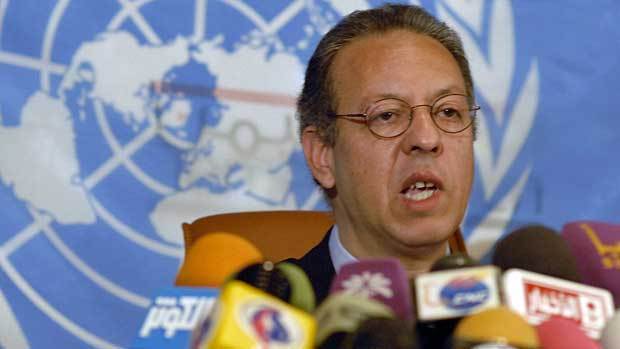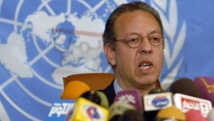"The Yemeni peace negotiations will start tomorrow in Kuwait under the auspices of the United Nations," said UN spokesman Stephane Dujarric.
A delegation of rebels left Yemen's capital on Wednesday to join the talks saying the UN had assured them over the ceasefire.
Representatives of Huthi rebels and their allies boarded an Omani plane bound for Kuwait via Muscat, said a Sanaa airport official.
The UN-brokered talks had been set to open in Kuwait on Monday but were put off after the Iran-backed insurgents failed to show up over alleged Saudi violations of the ceasefire, which took effect on April 11.
In remarks at a Gulf summit in Riyadh, Saudi King Salman expressed "hope that the talks in Kuwait will result in positive progress".
The government delegation which arrived in Kuwait at the weekend, had threatened to pull out if the talks did not start Thursday morning.
The delegation, in a statement, also accused the Huthi rebels of violating the ceasefire in many areas.
A Saudi-led coalition launched air strikes in Yemen 13 months ago after the rebels, who had seized control of Sanaa in 2014, advanced in other parts of the country.
President Abedrabbo Mansour Hadi's government fled to main southern city Aden but its members still spend most of their time in Riyadh.
The loyalists have managed since July to reclaim large parts of the south, including temporary capital Aden, but have been unable to dislodge the rebels from Sanaa and other key areas.
On Tuesday, UN chief Ban Ki-moon had urged both sides to work with his envoy Ismail Ould Cheikh Ahmed "so that talks can start without further delay".
The rebels' Al-Masirah television quoted Huthi representative Saleh al-Sammad as saying they agreed to join the talks after receiving assurances from the UN envoy and ambassadors that loyalists would respect the ceasefire.
A Western diplomat in Kuwait said representatives of the five permanent members of the UN Security Council sent a message to the rebels saying they "understand their fears" and urging them to "quickly join" the talks.
- Ceasefire monitors deploy -
Writing on Facebook, Mashat warned however that "we will have the right to suspend our participation" if the assurances are not met.
An official of the rebel-allied General People's Congress party, Yasser Alawadi, said on his departure from Muscat that there would be "no discussion of political issues until the ceasefire is respected".
But another GPC official, Yahia Duwaid, was more "optimistic", saying the UN had helped "overcome many obstacles which had delayed our arrival in Kuwait".
The GPC is led by former Yemeni president Ali Abdullah Saleh, who ruled the country for 33 years until 2012 and has joined forces with the Huthis.
Yemeni sources close to the talks say the insurgents are demanding the lifting of UN sanctions against Saleh and Huthi leaders.
Yemen's internationally recognised government is demanding the Huthis abide by a Security Council resolution calling for a political process and for the rebels to withdraw from cities they seized while surrendering their weapons.
Clashes have continued despite the ceasefire.
A military officer said Wednesday that 16 rebels and three pro-government fighters had been killed over the previous 24 hours in the Nahm region, northeast of Sanaa.
There were intermittent clashes in Nahm and Marib, east of Sanaa, sources there said.
Committees formed jointly by the rebels and loyalists to monitor the ceasefire deployed on Wednesday in both areas, said a spokesman for the committees' pro-government members.
The conflict has raised tensions between Sunni Arab states led by Saudi Arabia and its main regional rival, Shiite powerhouse Iran.
US President Barack Obama travelled Wednesday to Saudi Arabia, where he was expected to discuss the wars in Yemen and Syria with Gulf leaders.
The United States has provided precision-guided weapons and intelligence support to the Saudi-led coalition, which has faced mounting criticism for the number of civilian deaths from its air strikes.
----------------------------------------------------------------------------------------------------------
A delegation of rebels left Yemen's capital on Wednesday to join the talks saying the UN had assured them over the ceasefire.
Representatives of Huthi rebels and their allies boarded an Omani plane bound for Kuwait via Muscat, said a Sanaa airport official.
The UN-brokered talks had been set to open in Kuwait on Monday but were put off after the Iran-backed insurgents failed to show up over alleged Saudi violations of the ceasefire, which took effect on April 11.
In remarks at a Gulf summit in Riyadh, Saudi King Salman expressed "hope that the talks in Kuwait will result in positive progress".
The government delegation which arrived in Kuwait at the weekend, had threatened to pull out if the talks did not start Thursday morning.
The delegation, in a statement, also accused the Huthi rebels of violating the ceasefire in many areas.
A Saudi-led coalition launched air strikes in Yemen 13 months ago after the rebels, who had seized control of Sanaa in 2014, advanced in other parts of the country.
President Abedrabbo Mansour Hadi's government fled to main southern city Aden but its members still spend most of their time in Riyadh.
The loyalists have managed since July to reclaim large parts of the south, including temporary capital Aden, but have been unable to dislodge the rebels from Sanaa and other key areas.
On Tuesday, UN chief Ban Ki-moon had urged both sides to work with his envoy Ismail Ould Cheikh Ahmed "so that talks can start without further delay".
The rebels' Al-Masirah television quoted Huthi representative Saleh al-Sammad as saying they agreed to join the talks after receiving assurances from the UN envoy and ambassadors that loyalists would respect the ceasefire.
A Western diplomat in Kuwait said representatives of the five permanent members of the UN Security Council sent a message to the rebels saying they "understand their fears" and urging them to "quickly join" the talks.
- Ceasefire monitors deploy -
Writing on Facebook, Mashat warned however that "we will have the right to suspend our participation" if the assurances are not met.
An official of the rebel-allied General People's Congress party, Yasser Alawadi, said on his departure from Muscat that there would be "no discussion of political issues until the ceasefire is respected".
But another GPC official, Yahia Duwaid, was more "optimistic", saying the UN had helped "overcome many obstacles which had delayed our arrival in Kuwait".
The GPC is led by former Yemeni president Ali Abdullah Saleh, who ruled the country for 33 years until 2012 and has joined forces with the Huthis.
Yemeni sources close to the talks say the insurgents are demanding the lifting of UN sanctions against Saleh and Huthi leaders.
Yemen's internationally recognised government is demanding the Huthis abide by a Security Council resolution calling for a political process and for the rebels to withdraw from cities they seized while surrendering their weapons.
Clashes have continued despite the ceasefire.
A military officer said Wednesday that 16 rebels and three pro-government fighters had been killed over the previous 24 hours in the Nahm region, northeast of Sanaa.
There were intermittent clashes in Nahm and Marib, east of Sanaa, sources there said.
Committees formed jointly by the rebels and loyalists to monitor the ceasefire deployed on Wednesday in both areas, said a spokesman for the committees' pro-government members.
The conflict has raised tensions between Sunni Arab states led by Saudi Arabia and its main regional rival, Shiite powerhouse Iran.
US President Barack Obama travelled Wednesday to Saudi Arabia, where he was expected to discuss the wars in Yemen and Syria with Gulf leaders.
The United States has provided precision-guided weapons and intelligence support to the Saudi-led coalition, which has faced mounting criticism for the number of civilian deaths from its air strikes.
----------------------------------------------------------------------------------------------------------









 Home
Home Politics
Politics











